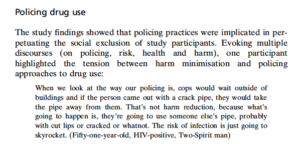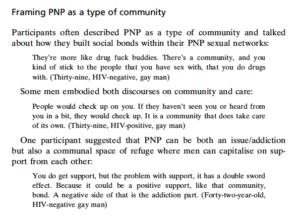Social Exclusion, Resilience and Social Worker Preparedness: Providing Services to Gay and Bisexual Men Who Party-N-Play
In this article researchers sought to understand the role social workers may play in furthering or combating stigmatization and marginalization when working with gay and bisexual men who PnP. To do so, researchers conducted interviews with 44 gay and bisexual men who PnP in Toronto. Upon examining the data, researchers presented findings under two broad categories: social exclusion and resilience discourses. Under the former category, participants detailed stigma and discrimination in health care settings. Here, participants described being mistreated within healthcare environments due to the stigma associated with injection drug use (IDU). In turn, this mistreatment led to hesitations to disclose sensitive health information related to PnP. In comparison, under the latter category, participants described relations of care as manifestations of resilience, detailing how folks in the PnP community often rely on one another to garner social support and harm reduction tools. Ultimately, these findings demonstrate that broadly, gay and bisexual men in the Toronto area face outright discrimination from service providers when disclosing that they PnP, and as a result, may fail to disclose important but sensitive information.

By highlighting these experiences of discrimination, researchers underscore the importance of providers introducing a harm reduction lens and critical reflexivity in their practices. By doing so, providers can work to combat stigma, and provide a space for gay and bisexual men who PnP to garner social support and harm reduction tips beyond the party scene. As well, reflecting on the socio-cultural and political issues that frame how we think about and respond to illicit drug use and sexual practices may facilitate in providers garnering a better understanding of the structural context and pragmatics of PnP. In addition, the researchers recommend that service providers work to counter stigma by invoking an empowerment approach, allowing their client to take action towards increasing personal, interpersonal or political power. As well, researchers highlight the importance of service providers being critical and reflexive, working to unpack their own biases against substance use, sex, sexuality and non-normative intimacy.
Finally, researchers underscore the importance of providers working to help their client to articulate the particular meanings of their behaviours, the settings where PnP takes place, as well as if these behaviours represent an issue. In doing so, service providers will not be immediately drawn toward problematizing PnP, but rather, will be encouraged to meet the client where they are at. Ultimately, this article does well for establishing best practices for implementing validating, sex-positive and non-stigmatizing care. As well, the article represents the narratives of gay and bisexual men in the Toronto area who PnP, allowing providers to better understand the experiences and perspectives of the clients in which they work with.

Check out the link below to watch Dr. Souleymanov talk more about his research exploring how stigma impacts gay, bisexual and queer men who PnP.
Souleymanov, R., Brennan, D. J., Logie, C. H., Allman, D., Craig, S. L., & Halkitis, P. N. (2020). Social Exclusion, Resilience and Social Worker Preparedness: Providing Services to Gay and Bisexual Men Who Party-N-Play. The British Journal of Social Work, 00, 1-20. https://doi.org/10.1093/bjsw/bcaa181
